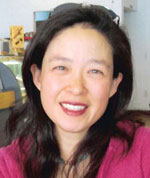Column: Adventures in Multicultural Living
My family went to an art exhibit opening and reception last summer at Wailoa Art Center in Hawaii. Afterwards, my son – “Little Brother” – pouted all night because he saw me kissing the artist, “that man.” He cannot kiss me ever again, he says, and he rubs and rubs his skin with his shirt, to wipe off every last kiss that I give him.
I try to explain that, actually, I was kissed by the artist, that sometimes people kiss hello on the cheek just like others shake hands. But he will have none of it. This is not the first time we have had this conversation, but what am I supposed to do? The artist, the man in question, is over 80 years old! That is a really funny (and completely irrelevant) distinction when you think about it from Little Brother’s point of view. He is four years old, and I am ten times his age; I would gain nothing by pointing out that the artist is (only) twice my age. So I explain that in Hawaii, it is part of the culture to hug and kiss hello, that even my parents now hug and kiss hello (although this took them a few years to get used to).
To say that Chinese people are not big huggers and kissers would be a colossal understatement. Growing up, my parents never hugged or kissed us, or said, “I love you.” But that was ok because nobody’s (Chinese) parents did. Only (Caucasian) people on TV did that sort of thing. We understood that they did love us, it just was not the Chinese way.
In my current “women and children only” sort of lifestyle, frantically running children to and from music lessons and swim classes with all the other moms, my interactions with men have dwindled to almost nothing. Sure, some dads drop off in the mornings, but they do not linger or get involved the way the moms do. As everyone is married and many on our side of Ann Arbor are Asian or Arab American, men and women tend to be especially proper, talk little, and do not touch. It seems quite natural, and I only notice when I step outside of it.
For example, I have to say, I love that European two cheek kiss thing, even though I know that that will never happen in my Chinese American community. My Italian friend Vincenzo was so surprised and pleased the first time I kissed his second cheek – he had already grown used to (the loss of) Americans only kissing one cheek. He smiled, “You do like the Italian way.” Of course. I do it for him.
So although I reassure my four-year-old that one kiss on the cheek from an 80-year-old Chinese American artist draped with leis means nothing, especially as we leave the house and he warns me to be careful in case someone else tries to kiss me again, I am also secretly delighted to be crossing cultures and encountering different ways of enjoying something so simple as a kiss.
Frances Kai-Hwa Wang is a second-generation Chinese American from California who now divides her time between Ann Arbor and Hawaii. She is editor of IMDiversity.com Asian American Village and a popular speaker on Asian Pacific American and multicultural issues. Check out her website at www.franceskaihwawang.com. She can be reached at fkwang888@gmail.com.





I also notice that Caucasians in Detroit commonly express their love before they terminate a telephone conversation.
As an Arab-American, I can relate to your words. It’s so cool to know how to greet different cultures in different ways. I still like to hold on to it. I have friends who have lost the “2nd kiss” and now do one kiss and a hug. I have friends from Lebanon who are accustomed to the 3rd kiss- one kiss on each cheek and the last one back where it started. The interesting thing is the oddness in greeting those who have assimilated to the culture here. Do I kiss them or do I just hug them, or maybe just a hand shake? My girls (5 and 7) are growing up having to give the 2 kisses to their grandparents, and relatives who they don’t see daily. The ones they see daily are now a good hug. I spoke with my husband yesterday who is in Nazareth visiting his mom. He went out with his cousins to celebrate Valentine’s Day. The “American Way” reaches far and wide. Everyone around had excuses to kiss. That same evening I went to a friends party and as I walked in, all 15ish people stood to greet with a kiss- the Arabic way-cheek-to-cheek. It takes a few minutes to get around, but it felt like home. Thanks, Frances- I enjoy reading your column.
As a grad student at UM I met, through friends, a group of South Americans and southern Europeans who had regular dance parties at different peoples houses or apartments. Early on, toward the end of one party, a woman was leaving and everyone had circled around her to say good bye and she worked her way around the circle, giving out one, two or three kisses depending on the person’s background. When she got to me (Caucasian, born here in Michigan and pretty shy), she stopped, looked at me a moment and asked ‘Do you kiss?’. In one of the few times I actually managed to think on my feet I answered: ‘As often as possible!’; I got lots of laughs and a kiss on the cheek.
OMG, I can’t believe that I completely forgot about three-cheek kisses! Those used to be my favorite! Thanks for reminding me of their existence. Hmmm, who shall I kiss next?
Frances Kai-Hwa Wang